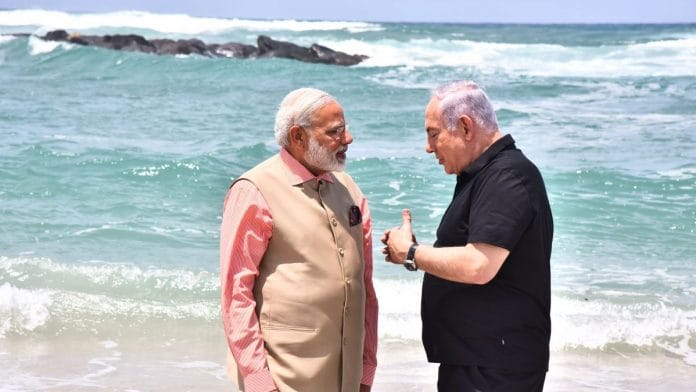Modi-Netanyahu closeness is well-known
Indian Prime Minister Narendra Modi features in his Israeli counterpart Benjamin Netanyahu’s election campaign hoardings that adorn the latter’s Likud party’s headquarters. Israel votes on 17 September.
In posing with Modi, Netanyahu is reminding the voters that he has formed strong alliances with powerful global leaders, which he has used to further his regional security policies.
The bonhomie between Modi and Netanyhu is well-known in both India and Israel. In 2017, Modi became the first Indian PM to tour Israel. Netanyahu had even called Modi to congratulate him on his Lok Sabha election victory in May this year. The two leaders are expected to meet in September, a few days before the elections.
נתניהו. ליגה אחרת. pic.twitter.com/07YGtjfXwL
— Benjamin Netanyahu (@netanyahu) July 28, 2019
After the polls in April, Israeli lawmakers had voted to dissolve Knesset, the Israeli Parliament, as neither Likud nor the main opposition party, Blue and White, were able to form the government.
Both the sides are now campaigning hard for the upcoming elections. A poll by Keevoon, an Israel-based pollster, found that national security is the number one issue for voters in this election.
Blue and White have tried to present a strong security-focused alternative to Netanyahu, giving officials of top Israel Defense Forces (IDF) leading roles in the party, but have till been unable to break Netanyahu’s image as the ‘defender of Israel’.
This image is keeping Netanyahu afloat, but the opposition will try to leverage his upcoming indictment on charges of corruption, bribery and fraud.
US-Israel camaraderie
Besides Modi, US President Donald Trump and Russian President Vladimir Putin also feature in Netanyahu’s poll campaign hoardings.
Netanyahu has used his relationship with Trump — his closest ally among the three leaders — to rapidly advance his foreign and security policies.
In 2017, the US moved its embassy to Jerusalem and recognised the city as the capital of Israel, reversing nearly seventy years of US foreign policy. Jerusalem has some of the holiest sites in both Islam and Judaism, and Palestinians have long hoped that East Jerusalem could become the capital of a future Palestinian state.
The move was widely condemned in the international community as a huge setback in the peace process. For Netanyahu, however, it was a major victory.
Trump also recognised Israel’s sovereignty over Golan Heights, which Israel captured from Syria during the six-day war in 1967. The US is the only state to recognise Israel’s claim to the territory, and many saw the move as an attempt to bolster Netanyahu’s numbers in the polls.
Netanyahu, in return, thanked Trump for the recognition by naming a proposed settlement in the West Bank as ‘Trump Heights’.
In 2018, Trump pulled out of the Iran nuclear deal and re-imposed sanctions, crippling Iran’s economy. The move was applauded by Netanyahu, who was the first Israeli PM to say that Iran is the ‘greatest threat to Israel’s existence’.
Israel and Russia
Despite Russia’s arms sales to Iran and strong trade links between the two countries, Putin is an important ally for Netanyahu.
Russia is currently the only state to have open talks with every major player in the Middle East, including Israel’s regional opponents Iran and Saudi Arabia, and non-state groups such as Hamas and Hezbollah.
Shortly before the elections in April, Netanyahu and Putin met to discuss coordinated security policy in Syria. Israel has carried out hundreds of airstrikes in Syria against Iran and Hezbollah, who have been working with Russia to prop up Bashar al-Assad’s regime. Mediating this threat is a key element of Netanyahu’s Syria policy.
Israel also has a large Russian population — around 12 per cent of eligible voters — that has favoured opposition parties over Likud so far. Netanyahu hopes that he can attract Russian voters by flaunting his relationship with Putin.
Israel and India have fewer pressing security issues to discuss, but Netanyahu will use the photo-op with Modi to boost his international image before the elections.







A political leader however strong and worldwide known is not important but how he is helping those who are suffering in this world, is the real criteria weather he is a real political leader or Just an ambitious person with selfish aims.